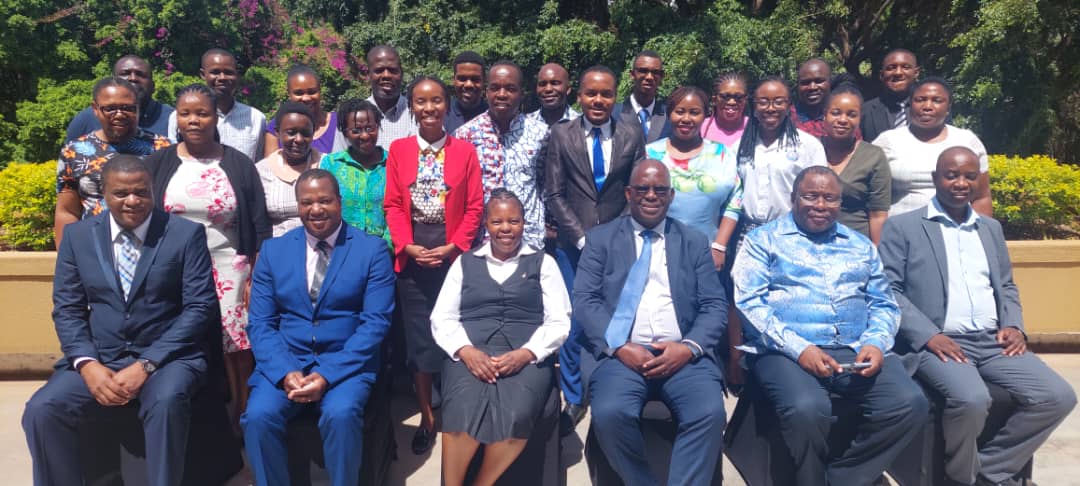|
Getting your Trinity Audio player ready…
|
The African Union Development Agency (AUDA-NEPA) is holding training to create awareness among in-country regulators drafting and implementing policies and regulations critical for shaping communication and advocacy narratives on genome editing.
In a speech on behalf of Mr. Willard Munango, the Deputy Chief Secretary for the Office of the President and Cabinet, Mrs. Anna Tinarwo, the Chief Director of Devolution and Development Planning said as the science and technology community rapidly progresses, stakeholders must be well-informed and actively engaged in discussions on regulatory frameworks to ensure responsible and ethical application of Genome Editing technologies.
“The objectives of today’s meeting are multi-fold. First and foremost, we aim to provide a comprehensive understanding of the basic concepts of Genome Editing. This will serve as the foundation for our discussions and create a common knowledge base among all participants, regardless of their background or level of expertise. We believe that fostering a clear understanding of Genome Editing is essential for ensuring informed decision-making and effective regulation.
“Secondly, we will examine the existing global legal instruments for Genome Editing. By doing so, we will gain insights into international standards and guidelines that can inform and shape our own regulatory frameworks. This exploration will enable us to learn from global best practices, understand potential challenges, and identify opportunities for collaboration in the area of Genome Editing regulation.
“Additionally, we will critically assess the existing legal landscape of Genome Editing in Zimbabwe and the wider African continent. This will allow us to appreciate the current state of affairs, identify gaps, and develop strategies tailored to address our unique challenges and opportunities as a country. By recognizing and appreciating our legal landscape, we can work towards harmonization, consistency, and effective regulation across all sectors,” Mrs Tinarwo said.
The workshop will dedicate time to comprehensively understand the regulatory procedures for Genome Edited products. This includes exploring the roles and responsibilities of various stakeholders, examining risk assessment protocols, and discussing ways to ensure transparency, public engagement, and adherence to ethical considerations.
By gaining a deeper insight into the regulatory procedures, stakeholders can collectively strengthen their capacity and streamline processes for reviewing and approving Genome Edited products.
She applauded the African Union Development Agency for the financial and technical support and commitment to fostering scientific excellence and promoting responsible innovation in Africa in contributing to the shared vision of a prosperous and sustainable future.
Prof Fanuel Tagwira, the Permanent Secretary for the Ministry of Higher and Tertiary Education, Innovation, Science, and Technology Development said under Education 5.0, Zimbabwe is committed to harnessing science and technology to realize Vision 2030 i.e., is ‘Towards a Prosperous & Empowered Upper Middle-Income Society.
“As a country, we do not want to be a net importer of technologies. We boast of a very vibrant seed industry which as a Ministry we will support by producing scientists who can harness new and emerging technologies. Besides our role in research, development, and innovation under this project, we are also responsible for regulation. Our agency the National Biotechnology Authority is mandated to support and manage biotechnology, research, development, and application in agriculture, industry, environment, and health sectors.
“We assessed our legislation, the National Biotechnology Authority Act [Chap. 14:31] of 2006 and concluded that it has provisions for regulating Genome Editing. All the same, we need to strengthen the existing provisions to provide adequate guidance to technology developers. To this end, we will draft regulations for Genome Editing. The exercise will include all key stakeholders in a bid to ensure that we leave no one behind,” Prof Tagwira said.
He encouraged participants to actively engage, collaborate, and make the most of the training since together, stakeholders will build a regulatory framework that harnesses the potential of Genome Editing for the greater good while ensuring the highest standards of safety and social responsibility.
Dr. Deckster Savadye, the CEO and Registrar of the National Biotechnology Authority said a group of African scientists, regulators, media, and R&D experts from the project countries worked together to develop genome editing curricula and training modules.
“AUDA-NEPAD is running a Genome Editing Communication and Advocacy pilot project. The participating countries are Burkina Faso, Ethiopia, Ghana, Kenya, Nigeria, Mozambique, Malawi, and Zimbabwe. These modules were developed to support in-country training.
“The overall objective of this week’s training is to create awareness among local regulators on drafting and implementing policies and regulations critical for shaping communication and advocacy narratives on genome editing,” Dr. Savadye said.
